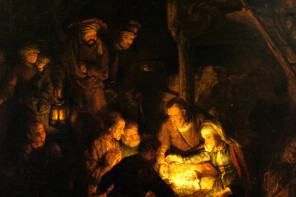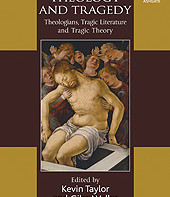The availability of recorded music has rendered music and song so ubiquitous that the intrinsically ephemeral nature of this art form, considered by Etienne Gilson to be ‘an art of time’, is seldom appreciated.[1] And yet, the contingency of the being of music prompts us to consider the contingency of being itself, so that music–and, more specifically, song–can be used as a theological image.
St Augustine said that ‘only the lover sings’, and the Lover is none other than God, whose love moves him to sing creation into being.[2] As such, we can think of creation as God’s song, and the Holy Trinity as the divine musician. The Father is the origin of the song. One might say that he knows the tune in his intellect. But without words, and without breath to produce the sound, this tune is not yet a song. When the Father sings, then, it is also by his Word and with his Breath–both of which proceed from him–that the song of creation is being sung and sustained in being. For the entire Trinity is involved in the act of creation. Once the singer stops singing the song dies; so, too, does creation, with all its polyphonic beauty and variety, depend entirely on God for its existence and development.
Philip Ball’s exploration of the musical ‘instinct’ in the human person contends that there is something uniquely human about our ability to hear and make music; it is ‘a part of what we are and how we perceive the world’.[3] This contention is consonant with our image of creation as God’s song and of God as the divine musician. Our creation in God’s image and likeness implies that we, too, are musical. As musical creatures, we are uniquely positioned to enjoy God’s creation and to be creative.
Into the symphony of creation, a solo voice is sounded that, as Benedict XVI put it, is ‘so important that the significance of the entire work depends on it.'[4] In the Scriptures, the coming of Christ is heralded by a fresh outburst of song that culminates in the new song of the redeemed (cf Apoc. 14:3). For Christ not only adds his voice to the song of creation but also becomes a part of it and, by his redeeming work, introduces a new song. Hence, the eternal Word has taken on the flesh of music, so that, as St Clement of Alexandria said, Christ has become incarnate as the New Song.[5]
For us Christians, then, being called to sing the new song of the redeemed means to harmonize our lives with Christ, sustaining the life of grace, the new song that we sing, with the breath of the Holy Spirit. For without him, we would be asphyxiated, unable to sing anything; but with him, our lives can be beautiful and mellifluous like the New Song that is Jesus Christ. Our lives of Christian sanctity thus become a love song that attracts others to God, the Lover of all that is.
[2] cf. Josef Pieper, Only the Lover Sings: Art and Contemplation (San Francisco: Ignatius Press, 1990).
[3] Ball, The Music Instinct (London: Vintage Books, 2011), 31.
[4] Benedict XVI, Verbum Domini, §13
[5] Cited in Stapert, A New Song for an Old World (Grand Rapids: Eerdmans, 2007), 51ff.






This is a wonderful post.
Nowadays music has grown into something casual, easy, and even into an unavoidable pollution (like advertisements). It is taken as part of the leisure culture or another product of consume, so it is easy to lose sight of its authentic relevance and what music has meant to humanity before our days. It has always, until not so long ago, had a place of privilege in human life.
Thank you sir for sharing these reflections!
Music express the pure dynamism of live as it only exist in an integrative dialogical (or trialogical) tension that is far away from a Heraclitean or a Hegelian war of the contraries.
The intuition of the transcendence of the song exists in traditions all over the human history, always linked to the gifts of the gods or to the very divine perspective of existence, as a creative unveiling of the being; but it takes a special relevance in this correspondence with the loving logic of a Trinitarian God. And with how this has to do with the specificity of the human voice!
Animals can sing, with an amazing beauty that can go far beyond anyone’s expectations, it is a beauty that express the exuberant order of nature and it lacks of a song. The particularity of the human voice is its logos. And when you think of this logos as Love, the name of the Canticle of Canticles make so much sense…
The song is the result of the touch between the human heart and the world. We sing the music of the world as it resounds in our hearts and is projected far beyond. Humanity sings out of need of expressing the sense revealed in this resonance, because our hearts can’t keep silent about the realities that bloom when we treasure. When the sing and the voice -the word- get together through musicality, they reveal a whole dimension of the existence.
It is not casual that every meaningful action in human life necessarily summons the song. This somehow transmutes reality (like singing while working changes the hard effort into a pleasure).
People used to think that the song was the original language of reality… But since we are placing “things” between life and us, it is like if the songs were turning mute.
I like the analogy that you have created with music, the creator and creation. This reminds me of the old concept of the “music of the spheres” but instead with the true creator of music and the entire created order. Great article.